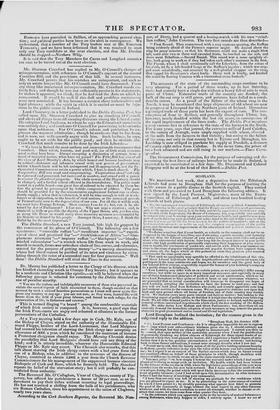Mr. Sharman Crawford has replied to Mr. O'Connell's charges of
misrepresentation, with reference to O'Connell's support of the second Coercion Bill, and the provisions of that bill. In several instances, Mr. Crawford proves that his mistakes are unimportant, and such as only an astute lawyer like Mr. O'Connell could have discovered. From any thing like intentional misrepresentation, Mr. Crawford stands en- tirely free ; and though he was not sufficiently precise in his statements, he makes it apparent, we think, that be had read the Acts on which he consented. It would be well if this dull and profitless controversy were now concluded. It has become a contest about technicalities and legal phrases ; while the spirit in which it is carried on must be inju- rious to the public cause in Ireland.
Lord Cloncurry, in a letter published in the Dublin Evening Post, has called upon Mr. Sharman Crawford to give up attacking O'Connell, and above all things to avoid creating divisions among the Liberal party. He eulogizes Lord,1 nglesea, to whom lie says the Education Com mission was entirely due ; and condemns O'Connell for persevering in his attacks upon that nobleman. For O'Connell's talents and patriotism be ex- presses the warmest admiration ; though he confesses that he has been, and is now, not 'Infrequently angry with him. Such feelings, he says, ought to be set aside for the public good; and then he reminds 31r. Crawford that much remains to be done by the Irish Liberals- " We have in Ireland the most uniform and unexceptionable Government that I recollect. Their talent, honesty, and good-will, are of little avail, counter- acted as they have been. Always excepting a diminution of outrage from a dread of impartial justice, what have we gained ? The Tithe Bill has almost all the ekes of Lord Stanley's Acts, by which honest and humane landlords may be robbed—dishonest and inhuman armed with new powers of persecution; whilst Church lands will be left unimproved and ill-appropriated, and the Ec- clesiastical Commissioners retain a power which, I fear, is much abused. The Corporation 11111 was weak and compromising. Corporations should not only be ref brined and preserved, but increased in number, and armed with a power to recover the plundered property. The whole system of the Magistracy should be changed, and a further reform effected in the constabulary. The public roads vested in a public board—one great line of railroad to be executed by them be- fore the ground be preoccupied by bubble-companies of jobbers. The poor
should be provided for by the remunerative employment Ireland can so abun- dantly supply ; when that is exhausted, it will be time enough to talk of work- houses or of emigration, to the benefit of rival nations, or the increased growth
of Transatlantic corn to the depreciation of our own. For all this it will be said, we must have Peerage Reform. Most anxious I am for it ; but, can it be ob- tained by Act of Parliament? I fear not. Why not urge a creation ' • and, to diminish as little as possible the dignity of the Upper House, add, pro hat vice, as many life Peers as would carry those necessary measures recommended by his Majesty or desired by his people. Amongst those, I must say, I think the Ballot by far the most important."
The Dublin Standard, a new Tory journal, bids high for support by the coarseness of its abuse of O'Connell. The following are a few specimens : " execrable ruffian "—" mendicant impostor "—" experi.
enced cheat and practised liar "—" Stinkbinksem of Africa "—" blas- phemous miscreant "—" impious ruffian "—"blackguard "—" bloody-
minded calumniator "—"a wretch whose life from week to week, and month to month, forms one unbroken chain of lies, curses, and calumnies, uttered for the purpose of getting money "—" a moving abomination, whose bad blood cannot be purified of its taint and virulence by circu- lating through the veins of a scoundrel race for four generations." Well done! the Dublin Standard will rival the Times in due season.


























 Previous page
Previous page